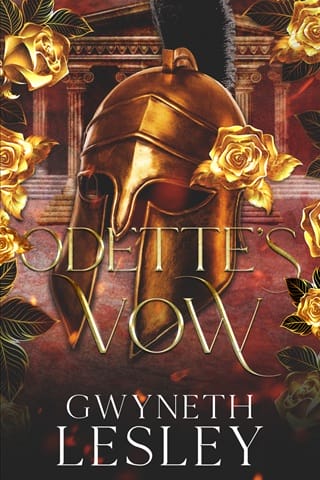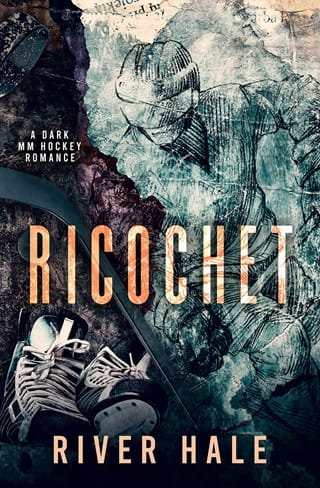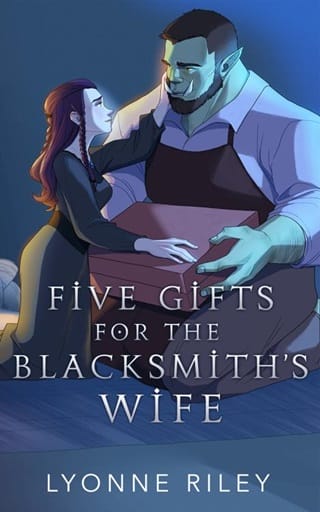11. Odysseus
11
Odysseus
I stood with a white-knuckled grip on the prow of my ship as my men rowed in uneasy silence. Their faces were pale in the dim light of the cave we now found ourselves in. I had no recollection of how we had gotten here. All I knew was that my every instinct was screaming at me to turn the ship around, yet no words came.
Our ship continued through murky waters, the mist surrounding us thickening, the air violently cold. I shivered, despite my resolve, and the men continued with their steady, measured strokes, though I knew they did not want to.
We were approaching the edge of the living world, closing in on the gateway to the dead.
I gripped the hilt of my sword tightly, the leather-wrapped handle cool and firm against my palm. I traced each ridge and groove of the intricate design with my forefinger until my breathing evened out as we crossed the threshold. An unsettling silence blanketed the world around us. The scent of decay and freshly turned soil hung heavy. As we reached the pebbled shoreline, I disembarked first, my boots sinking into the cold, damp ground. The landscape was barren, a wasteland of shadow and sorrow. Then came the distant, mournful wail of the spirits.
We had prepared offerings, of course – black sheep for the dead and libations of honey, milk, and wine. The sheep bleated woefully behind me.
I led my men with determined steps to a suitable spot and drew a trench in the earth with the hilt of my sword, a channel through which we would pour the blood of our sacrifices. The ground beneath our feet was unyielding, a reflection of how the dead treated those of us still living. I could tell from the long shadows cast by the eerie glow of the Underworld’s twilight that others were watching us. The men could sense it, too; their movements were stilted at best.
Exhaling sharply, I called upon the gods of the Underworld, invoking Hades and Persephone, and began the ritual. The names felt heavy on my tongue, filled with ancient power, and the darkness around us seemed to deepen in response, as if the very air was waiting on us – on me. Tugging the restless animal to me, I slit its throat, letting its rich blood flow into the trench, a river of crimson seeping into the earth, the scent of it overwhelming as it permeated the smell of decay.
More of the dead began to gather.
Next, I poured the honey, milk, and wine into the trench, the libations mixing with the blood. The dead lurched forward, pale and indistinct at first, becoming more corporeal as they drank from the trench. I steeled myself, knowing that among them would be those I had known and lost, that there might be some who blamed me for their early arrival in this place.
The first spirit to approach me was Elpenor, a member of my crew. His presence confused me – how could Elpenor be here among the dead? We had parted ways only days ago on the battlefield, and yet his shade stood before me, skin pale and ethereal, unlike the vibrant man I had last seen.
Had he died in battle and I had not yet been told?
“Elpenor? What brings you here? How is it you’ve come to be among the dead?”
He did not respond directly. Instead his stare pierced through me with a silent plea. As he spoke, his voice was a hollow echo. “Odysseus, I beg of you, grant me a proper burial. My body lies unburied on Circe’s island, left to the mercy of the elements. I cannot find peace in this state.”
I shook my head in confusion. “Circe’s island? Elpenor, we have never been to such a place. What madness is this?”
A flicker of frustration crossed his spectral face, and his voice grew sharp, tinged with anger. “Do you not see my state? I speak of a future, one where you have failed me! My soul is restless, trapped between worlds, because you did not see to my burial.”
My heart pounded in my chest, until I thought I might die from the strength of its hammering beat. I struggled to reconcile Elpenor’s words with what I knew to be true. We were still outside the gates of Troy. Yet the anguish in his eyes was undeniable, a testament to a fate I had yet to understand.
“Elpenor, if ever we find ourselves on this Circe’s island you speak of, I will seek out your body and ensure you are given a proper burial. You have my word.”
His form seemed to flicker, the anger in his eyes dimming slightly as my promise reached him. But the sorrow remained, and I was left with the weight of my oath, and the unsettling knowledge of a future where I had failed a comrade.
The whispers of the dead became more insistent. From the shadows emerged a figure, tall and imposing, a warrior whose mere presence demanded respect. Achilles, the mightiest of the Greeks, strode toward me with the same power and arrogance he had wielded in life.
“Odysseus,” he called, his voice carrying a sharp edge. “Have you come to gloat, or to witness the eternal greatness of Achilles, even in death?”
“Achilles, even here, you cling to your glory.”
“Glory is all that matters, Odysseus. I am Achilles, the greatest warrior, and even in the Underworld, I deserve to be honoured.”
The Achilles I saw before me was not the noble warrior of legends, but a ghost obsessed with his own legacy. As I listened to him continue his tirade, memories of the living world flooded my mind, reminding me that Achilles had not yet returned to the war after I had last seen him. How could he be here, demanding recognition? If our greatest warrior was destined to fall, how could we hope to win this war and find our way home?
My mind raced, connecting pieces of this grim fate. Without Achilles, our mightiest champion, we were exposed. I had to think, had to find another way to outmaneuver our enemies.
Achilles continued to wax lyrical about glory. He spoke of battles not yet fought and victories won, his words dripping with self-absorbed pride. It was as if he were speaking to himself, reliving the moments of triumph that had defined his life. His gaze was distant, fixated on the past glories that now seemed hollow in this shadowed realm. Just as in life, Achilles was consumed by his own legend, deaf to the concerns of others.
His monologue droned on, but I was no longer listening, for another approached me with an air of solemn authority. It was the prophet, Tiresias, his eyes blind but, if the rumours were to be believed, seeing more than any mortal.
“Tiresias, why am I here? I am certain I am not supposed to be here, yet I clearly remember coming to this realm. Help me, old friend.”
The prophet nodded, as if expecting my plea. “Odysseus, son of Laertes, many perils await you on your journey. Listen well and heed my words if you wish not to return here before your time. Beware of those that sing you sweet words. Plug your ears with beeswax, bind yourself if you must, but do not succumb to the temptation, for their intentions are treacherous.”
I thought over his words. “You speak of sirens.”
He continued as if he hadn’t heard me, his voice steady and unyielding. “Be careful of being so all-consumed with your goal, shrewd Odysseus, that you are not devoured by the whirlpool that surrounds you, for that grasp is unforgiving. To steer yourself straight down the middle is wise, even if you lose a little along the way, for it is better to lose fewer things than more. Do not fear six-headed monsters when two-faced people are much more dangerous.
“Finally, upon your return to Ithaca, you must make a sacrifice to appease Poseidon, for he will harbour a great anger against you once you wrong him. Only by seeking his forgiveness can you ever hope to find peace in your homeland.”
His words lingered, the solemn directives settling heavily upon me. Why would I intentionally wrong a god like Poseidon? Just as I went to ask him, Tiresias raised a hand to silence me.
“Above all, remain vigilant, Odysseus. The greatest danger may come from those you least expect.”
I nodded, the finality of his tone telling me I would get no more out of him this night. “I will heed your warnings and follow your counsel. The gods willing, I will see Ithaca once more.”
Tiresias nodded, a faint smile across his face. “Then I will leave you in the hands of one who will help you leave this place.”
As he retreated into the shadows, I was met by the spirit of my mother, Anticlea. My breath caught as I recognised her form, her face.
“Mother?” I whispered, sorrow bearing down upon me. I had not known she was dead. I had not known the others were dead, was still not yet convinced they were, but for some reason she appeared more substantial, her body more ‘material’, and I knew. She was truly here. The thought struck me with a pain deeper than any I had felt before. “Mother, how can this be?”
She stepped closer until I could feel her ghost-like hands on my forearms. “Odysseus, my son. Your father is old and in poor health, living in seclusion. He would not see anyone, even me. Between that and a seemingly endless war, I died of grief, my heart broken at the long absence you both left. I could not bear the endlessness of it all.”
Tears burned in the back of my eyes as I reached out to embrace her. My arms passed through her, and I was reminded again of the cruel divide between the living and the dead. “Mother, I never meant for this to happen.”
She looked at me with a tender smile. “Do not grieve for me, my son. My time has passed, but yours is still unfolding. You must return to the living world. There are dangers that await you on your return home.”
I nodded, listening intently as she continued.
“In Ithaca, suitors plague your house, seeking to take your place. They consume your wealth and dishonour your home, believing you are dead. Penelope, your faithful wife, holds them at bay with her cleverness, but she cannot do so forever.”
The thought of Penelope, steadfast and enduring, filled me with both hope and dread. “How do I get home, Mother?”
“You have always been resourceful and wise, my boy. The gods have not finished testing you, but remember that those you love remain ever hopeful of your return. Let that be your fuel.”
I nodded at her words even as a gnawing doubt took hold, and my mind flickered back to the last time Penelope saw me, a horrible nightmare come to life …
She had been standing at the window of our home, a modest estate in Ithaca, watching me plough one of the fields. How strange; I had never considered the event from her perspective before. Perhaps because this was a place of pasts and futures, where I could consider something I should never have done. Something for which the gods would likely never forgive me.
I wondered if Penelope did.
As if thinking of her could conjure her form in this realm, she appeared, speaking the oracle’s words at me: if I went to war, I would be away for twenty years and return a beggar. I wasn’t sure how this could come to pass if the war was only to last for nine, but my wife seemed certain. Now she watched me as, like a madman, I sowed the field with salt instead of seeds. I knew she wasn’t the only one watching me; there were other eyes on me out there. I could feel them. Men who were angry that it was my cunning that originally bound them to this war.
But I did not want to be away from my family for twenty years. My son had just turned one. Please, gods, don’t take me away from him.
My mind was now, somehow, in Penelope’s body, glued to watching myself out the window. I could tell there were men behind me. I heard them gathering my son into their arms. He was crying out for his mother, but she – I – remained glued to watching myself.
They placed my son in the field. I was driving the plough straight toward him. If I truly were a madman, I would not think. I would run him over without a moment’s hesitation. There would be other children between us, I reasoned to myself. I knew what happened in this memory, but I couldn’t seem to pull myself away. In case this time it ended differently. In case this time it ended with his cry as the wheel began to crush his skull …
“You must wake before it is too late,” Penelope told me.
“You must wake.”
“You must WAKE!”
 Fullepub
Fullepub 



